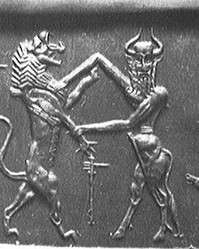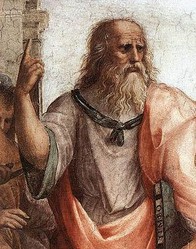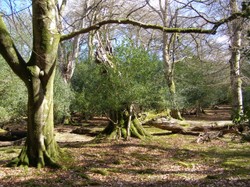The story of Gilgamesh, also known as Bilgames, the fifth king of Uruk (Mesopotamia, now Iraq) and his friend Enkidu is placed roughly 2500 BC, making it one of the oldest surviving pieces of literature. The story describes not only the friendship between the two man, but also touches on ever-lasting questions like good and evil, mourning the death of a friend and recovering from it and the, futile, quest for immortality. The second fascinating point is for me, how such an ancient text can be still relevant for us today and is readable and understandable without the need to study Assyriology ;-) and also the mere fact that it has survived until our time, more then 4,000 after it was written!

Gilgamesh - A Fascinating Book that is over 4,500 Years Old
by Sam
I was a teenager when I first read the 'Epic of Gilgamesh' and more then 30 years later this, perhaps oldest surviving, epic poem still fascinates me.
Recommended Books
Click any image to start reading a sample chapter or two ...
 | The Epic of Gilgamesh: An English Verison with an Introduction ‘I am Gilgamesh who seized and killed the Bull of Heaven, I killed the watchman of the cedar forest, I overthrew Humbaba who lived in the forest’ Gilgamesh, King of Uruk, and hi... Only $10.49 |
 | The Epic of Gilgamesh (Penguin Classics) Originally the work of an anonymous Babylonian poet who lived more than 3,700 years ago, The Epic of Gilgamesh tells of the heroic exploits of the ruler of the walled city of Ur... Only $11.5 |
 | The Babylonian Gilgamesh Epic: Introduction, Critical Edition and Cuneiform Texts 2 Volumes The Babylonian Gilgamesh epic is the oldest long poem in the world, with a history going back four thousand years. It tells the fascinating and moving story of Gilgamesh's heroi... Only $595.0 |
 | The History of the Ancient World: From the Earliest Accounts to the Fall of Rome A lively and engaging narrative history showing the common threads in the cultures that gave birth to our own.This is the first volume in a bold new series that tells the storie... Only $17.9 |
Story Short Summary
Gilgamesh, son of Lugalbanda, a human that later was elevated to god-like status and Ninsun, a Sumerian goddess is the 5th King of Uruk as the poem begins. Gilgamesh oppresses his people by exploiting the men in building projects and similar and taking, to put it politely, liberties with the women. Therefore the people of Uruk cry to the gods for help who in turn answer them by creating a 'wild man' named Enkidu which is equally in strength to Gilgamesh. After some 'civilization' of Enkidu, carried out by a temple prostitute, I leave the details to your imagination - you can read them in the poem for yourself, he is ready to meet Gilgamesh in Uruk. After a fierce battle the two become friends and decide, typically male!, that they want to go on adventures together to earn honor and glory!
Their adventures include the killing of a monster (Humbaba), the cutting down of many cedar trees (you could call that the first recorded example of ecological damage done by humans), the rejection of the beautiful goddess Ishtar by Gilgamesh, not surprisingly as that lady was known for treating her lovers cruel and sometimes even causing their deaths, and the killing of the 'Bull of Heaven' which was send by Ishtar to take revenge on Gilgamesh (sic!).
Unfortunately Ishtar was also the main goddess of Uruk, goddess of love and war to be precise, and she didn't take the reproach lightly! Together with the other gods she decided that one of the two friends needed to die and finally the divine council settled on Enkidu as the victim! Speak about good deeds that never go unpunished ...
Following Enkidu's death Gilgamesh becomes so depressed that he forgets who he is and goes off to live in the wilderness. After a while his concern centers around his own mortality and he starts to look for ways to prolong his own life, or even better, to become immortal. He searches for a man called Utnapishtim, one of the few survivors of the Great Flood, see below, but despite finding him, he fails to achieve his ultimate goal. So he returns to Uruk, which he finds growing and flourishing, perhaps thanks to his absence? Finally he learns to accept that the only immortality he can expect in life the the immortality of his name thanks to his achievements. A nice pun of history that the story of Gilgamesh gave him exactly this kind of immortality, his name is known to an awful lot of people, even more then 4,000 years after his death ...
So ends the actual 'Epic of Gilgamesh', but an addition to it describes also Enkidu's adventures in the afterlife see below. Obviously such a complex story has many more details and nuances than can be described in a summary, you have to read it for yourself ;-) Some recommendation for translations are included in this article.
I personally like the one below VVV the best ;-)
Modern translation in prose form - perhaps the most accessible one.
Click image to have a look inside and to start reading the first chapters!
 |
| The Epic of Gilgamesh: An English Verison with an Introduction |
Discovery and Archeology
The 'Epic of Gilgamesh' was re-discovered 1853 by Hormuzd Rassam, a native Assyrian assyriologist that had studied in Oxford, and was first translated into English by George Smith in 1870. The poem was written in Akkadian, a cuneiform script, on 12 tablets which were unfortunately already heavily damaged and got even more so during their transport to England. Over time other fragments have been found, in different languages of the area and slowly, over decades, the poem could be reconstructed. Until today it is still not complete, but now so far translated that it can be read with enjoyment.
Modern translation in verse form - perhaps the most accurate one.
Click image to have a look inside and to start reading the first chapters!
 |
| The Epic of Gilgamesh (Penguin Classics) |
Epic relationships with the Bible
The 'Epic of Gilgamesh' comes from the same area as the Old Testament, so it comes as no surprise that some events appear in both! One example for this is the Great Flood described in the story of Noah in the book of Genesis which shares many details with the story Utnapishtim tells Gilgamesh! Also the garden where Utnapishtim and his wife live has a strong resemblance to the garden Eden of the Bible.
Other similarities include the creation of Enkidu from dust / clay (like Adam) and a snake that 'steals' immortality from Adam and Eve, and their offspring, as well as from Gilgamesh.
All this comes as no surprise when you consider that stories and history were first oral tradition and then were, sometimes centuries later and after considerable alterations, written down. The story of the flood might well be the memory of a natural disaster that struck that area, which encompassed for the inhabitants their 'whole world'!, and that then got re-told and recorded by the people of the area in different languages and forms.
The story of Adam and Eve and how evil came into the world might well be based and inspired by the 'Epic of Gilgamesh' as this is nearly 2,000 years older than the first written accounts of the Book of Genesis!
There are other connection points between the Bible and the poem, but I leave them to you to find out for yourself ;-)
Scholarly Edition - Most Complete and Extensive Work, unfortunately also very expensive!
Click image to have a look inside and to start reading the first chapters!
 |
| The Babylonian Gilgamesh Epic: Introduction, Critical Edition and C... |
Which translation should you read?
There are some free translations and ebooks available on the internet, but they are all based on old translations that are now out of copyright due to the fact that the translator died more then 70 years ago. To get the most recent and complete translation you can either check if your local library has the book available or buy it from Amazon ;-)
There are basically three types of translations of the original text available:
- Into Prose - Easier readable and perhaps the best way to make 'first contact' with this ancient piece of literature.
- Into Verse - As the original is a poem, it does make sense that the translation is also one ;-)
- Annotated - Whilst all books I recommend here come with an introduction and some explanations of specific words and terms, this book takes scholarly study to new heights! Perhaps more interesting for history students than for 'normal people', especially if you look at the price!
Plus some transcriptions into novel, and even comic, form that I am not really fond off ... In my experience such an ancient text deserves to be read in a translation that is as close to the original as possible ...
Did Gilgamesh really live?
Whilst the adventures and events in the poem have a distinctive, legendary feel to them, archeologists and historians have little doubt that there was a real King of Uruk named Gilgamesh at one time. A German-led expedition even claimed to have found his tomb, see the BBC article below.
If you are interested in placing the 'Epic of Gilgamesh' into historical context, a book like this is a must-have!
Click image to have a look inside and to start reading the first chapters!
 |
| The History of the Ancient World: From the Earliest Accounts to the... |
Have you read the 'Epic of Gilgamesh'?
You might also like
A Brief Overview of The Symposium by PlatoWhat is Plato's The Symposium? And what was discussed during this good old fa...
Book Review of The Forest by Edward RutherfurdThe history of the New Forest in England is fictionalized through tales of th...



 How to Choose the Topic for your First Bookon 12/17/2012
How to Choose the Topic for your First Bookon 12/17/2012
 Why I published my first book on Amazon - and you should too ;-)on 11/30/2012
Why I published my first book on Amazon - and you should too ;-)on 11/30/2012
 What to do with Kids in Prague - Go To the ZOOon 10/30/2012
What to do with Kids in Prague - Go To the ZOOon 10/30/2012
 Choco Story Museum - Things to do with Kids in Pragueon 10/30/2012
Choco Story Museum - Things to do with Kids in Pragueon 10/30/2012



Comments
Hi again Sam, I read your piece on Gilgamesh with great pleasure, remembering the enthusiasm of reading a summary of it as a child. I will most certainly order a Penguin copy, and soon! Enjoyed your brief comments on the archaeology of the tablets -- how fascinating!! I never thought about the way this poem was recorded, but yes, given its origin and age, cuneiform script on tablets was the way to go!
True Thamisgith, but I also would love to have the spare change to afford the scholarly edition in two volumes ;-)
It's a great story - but you do need the translation that works best for you I think.